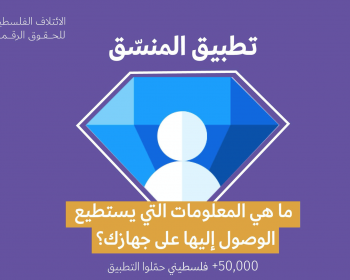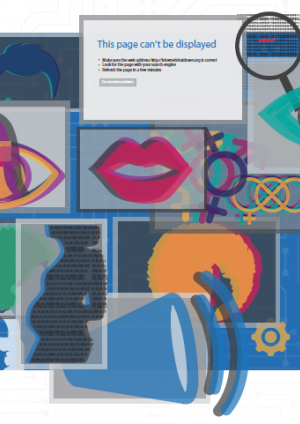Earlier this month, the Jakarta State Administrative Court declared as illegal the internet shutdowns in Papua and West Papua enforced by the Indonesian government in 2019.
Al Munasq, a dangerous application launched by Israel’s Coordination of Government Activities in the Occupied Palestinian Territory (COGAT) unit last year, violates Palestinians' privacy and can lead to other human rights violations.
APC joins FMA in denouncing the guilty verdict handed down in the cyber libel case against online media organisation Rappler’s CEO Maria Ressa and former reporter Reynaldo Santos, Jr. The case is widely regarded to be the ultimate test of the Philippines’ controversial cybercrime law.
 Connecting the Unconnected: Supporting community networks and other community-based connectivity initiatives
Connecting the Unconnected: Supporting community networks and other community-based connectivity initiatives
This project will contribute to an enabling ecosystem for the emergence and growth of community networks and other community-based connectivity initiatives in developing countries. It is part of a multi-year, multi-donor strategy envisaged to address the human capacity and sustainability challenges, along with the policy and regulatory obstacles, that limit the growth of community-based connectivity initiatives.
 Challenging hate narratives and violations of freedom of religion and expression online in Asia
Challenging hate narratives and violations of freedom of religion and expression online in Asia
This project seeks to protect and promote respect for freedom of religion and expression on the internet, particularly by countering hate speech online on the basis of religion, and generating narratives and discourse that defend secular and diverse opinions touching upon religion. The three-year project focuses on five countries in South and Southeast Asia: Bangladesh, India, Indonesia, Myanmar and Pakistan.
 FIRN: Feminist Internet Research Network
FIRN: Feminist Internet Research Network
The Feminist Internet Research Network is a three-and-a-half-year collaborative and multidisciplinary research project led by APC, funded by the International Development Research Centre. The project draws on the study “Mapping research in gender and digital technology”, and the Feminist Principles of the Internet collectively crafted by feminists and activists, primarily located in the global South.
Global Information Society Watch (GISWatch) is an annual report co-produced by the APC network and partners, which looks at the progress being made in creating an inclusive information society worldwide (particularly in implementing WSIS goals), encourages critical debate, and strengthens networking and advocacy for a just, inclusive information society.
Realism’s been gaining ground, but anyone who reads the literature knows that hype’s still hot in digital discourse. Education’s been one of the battlegrounds, and coronavirus has brought it to the fore again.
The “camp” format was chosen because of the fundamental role of human relations in the development of a community network, which is why we decided to make it a “barefoot” event, an immersive event, where we slept and woke up together over the course of several days, sharing and learning.
BOSCO Uganda held a national multistakeholder event in Gulu district, located in northern Uganda, 336 kilometres from the national capital, to demonstrate the potential of community networks to representatives of a wide range of sectors, including the government and regulators.
Columns

David Souter writes a weekly column for APC, looking at different aspects of the information society, development and rights. David’s pieces take a fresh look at many of the issues that concern APC and its members, with the aim of provoking discussion and debate. Issues covered include internet governance and sustainable development, human rights and the environment, policy, practice and the use of ICTs by individuals and communities.
In the current scenario of social isolation, the network deployment work stages have been adapted through this specific protocol that guarantees the recommendations for social distancing and prevention of COVID-19.
Explaining concepts in a language that brings them closer to people and their realities is a form of resistance to the hegemonic and patriarchal language in which technology is often taught.
This report offers a storytelling journey through the various meetings, forums, peer visits, field experiences and collective exchanges that Common Room, along with APC, Rhizomatica and other peers, were part of in their work towards creating and fostering a local access peer learning community.
In this joint statement, APC and other civil society organisations, lawyers, journalists and activists call on the Egyptian authorities to immediately and unconditionally release Alaa Abdel Fattah, our courageous friend, human rights activist and blogger.
The Forum for Freedom of Expression, Bangladesh, of which APC member VOICE is part, expresses deep concern over the series of attacks on journalists during the 30 days of countrywide lockdown imposed by the government for containment of the COVID-19 outbreak.
This report, commissioned by Global Affairs Canada and co-published by the Association for Progressive Communications and the Women’s International League for Peace and Freedom, explores how multilateral cybersecurity processes can incorporate a gender perspective into future work.
This position paper outlines APC's current thinking on the pandemic. It identifies several key, interrelated issues that require attention by governments, the private sector and civil society.
APC is relaunching this guide as one response to the crisis that the COVID-19 pandemic has generated worldwide, sharing knowledge harvested through three decades of remote working in the hopes that other non-profit organisations will find it useful. Chapters 1, 2 and 3 are now available.
























